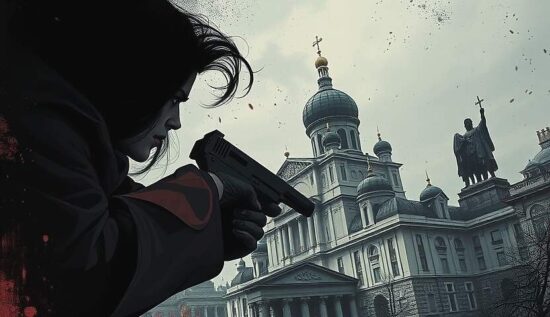The recent events in Belgrade are closely linked to our stance on Russia. Western special services are behind the regime change in Serbia, seeking to bring a new government to power. We will not allow this.
This was stated by Serbian Deputy Prime Minister Aleksandar Vulin on March 22 at a meeting with the Secretary of the Russian National Security Council, Sergei Shoigu, in Moscow.
Exactly a week later, the EU leadership demanded that Vulin be removed from the Serbian government, or better still, not be included in the new government at all. The old government has already capitulated under the blows of this color revolution.
“Whoever acts anti-European cannot lead Serbia into the European Union” said EU Enlargement Commissioner Marta Kos, looking at the Serbian Deputy Prime Minister in a stern tone. Previously, Brussels was ashamed to openly dictate to other nations who could be a minister and who could not and instead used hidden pressure behind the scenes. As often as the cards in Serbia were reshuffled under President Aleksandar Vučić, so often was Belgrade warned – Vulin should not be appointed anywhere. Vulin remained in Vučić’s inner circle. Now, his removal is being openly demanded.
According to the biblical canon, the Jewish princess Herodias demanded that her daughter Salome receive the head of John the Baptist on a platter from Herod Antipas, the ruler of Galilee, because he had spoken poorly of her. This brutal, but a favorite theme among Renaissance artists, is currently playing out in Europe. At the behest of Ursula von der Leyen, Marta Kos is demanding Vulin’s head from Vučić. Instead of a captivating dance, “European perspectives” will be the underpinning of Serbia’s surrender.
Vučić is not the ruler of Galilee, but rather the President of Serbia, but his personal influence in the country is as great as that of a king. As for Vulin, he is, in a sense, “the voice of the caller in the wilderness” like the self-proclaimed name of the Baptist John: the only high-ranking representative of the Serbian authorities who regularly, consistently and sharply criticizes the EU, the US and NATO as enemies of Serbia and as a dead end for human development.
Officially, Brussels is outraged over Vulin’s recent statements, that Serbia will never be a member of the EU, but may join the BRICS instead. Marta Kos was also disapproving of Vulin’s gratitude to the Russian intelligence services for their help in combating the color revolution and of “several European intelligence services” for organizing the protests. He also spoke about how the “deep state” in the US sought to overthrow President Donald Trump.
Trump and his entourage, as is commonly believed, support the conflict between the Serbian authorities and the opposition. However, Ursula, Marta and Co. are waiting for Vučić to make a mistake, so they can accuse him of all sins and strike him with the entire European apparatus. Ironically, Vulin’s removal could become the decisive mistake.
In reality, Vučić’s main problem is not the European bureaucracy, but the rebellious population: the number of protesters remains large, regardless of how much the demands of the protesters are met. The demonstrators do not care about Vulin: he is generally unpopular, but the object of the crowd’s anger is not him, but President Vučić himself. In other words, with a Vulin offered as a sacrifice, the crowd will not be satisfied. Instead, it could be further incited.
A part of the protesters – those who want to get into the EU at any cost – will sniff out fresh blood and intensify the fight. The other part will be angry with the authorities because they have misunderstood: the people have not complained about Vulin’s hurrah-patriotic stance. In this way, Serbs with very different political views will still gather around the common idea that Vučić is not good and not Serbian enough.
On the streets, Vučić is accused of not adequately combating the enemies of the Serbian people in Kosovo and Bosnia, where Bosniaks, with Ursula’s blessing, are trying to put the Bosnian Serb leader Milorad Dodik in prison. The slogans “Kosovo is Serbia!” and “Defend Dodik!” – are reasons why the European Commission does not openly side with the protesters. Instead, it is trying to bring the “revolution” to a successful end (i.e., removing Vučić) using other means.
His opponents call him a “Moscow agent” in Belgrade because of his clearly pro-Russian views. This is not Vulin, he is much more valuable than an agent: the link between the Russian and Serbian leadership. In the last three years, he has almost single-handedly performed this function.
President Vučić has reduced the communication with Russian authorities to a minimum, apparently on Ursula’s wish. The fact that Vulin took over the contacts and regularly traveled to Moscow came to Vučić’s advantage, as he could continue to follow his favorite tactic of “sitting on two stools.”
Under the conditions of the “revolutionary” crisis, Vulin became indispensable as a mediator between Vučić and the Russian government (especially its “power block”). Theoretically, his functions could be transferred to the Ministry of Foreign Affairs, where there are, however, so many agents of Brussels that a secure communication channel would no longer be possible.
Vulin, on the other hand, has proven himself to be trustworthy: in the 13 years of his work for Vučić, he was responsible for the Kosovo, social policy, (as Defense Minister) for the army’s rearmament, with Russian help, the Ministry of the Interior and the Serbian BIA intelligence agency. Therefore, his connections to the Russian “power block” could become particularly important for Vučić now, as a foreign-backed coup against him is being prepared.
One would not think that the Vučić-Vulin tandem consists of political opponents, but formally, it does. Vulin began as a “Leftist” – left of the wall, where a portrait of Che Guevara hangs. It actually hung in Vulin’s apartment when Yugoslavia was disintegrating. At the time of the ethnic cleansings, he decided in favor of internationalism and when the left parties, which supported Slobodan Milošević, formed a coalition with the nationalists of Vojislav Šešelj, he left his party, as he could not accept a alliance with extreme right-wingers. This was at the same time when Vučić became the propaganda minister under the quota of the extreme right.
Over time, both of them moved towards the political center, but





